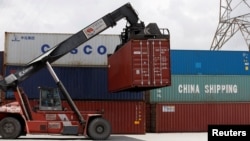Vietnam is gradually offering the eager Chinese new places to invest, from real estate to factory production, despite its history of resisting China over political issues.
Chinese investors are buying property in the financial center, Ho Chi Minh City, and may get a chance from next year to lease land for up to 99 years in three special economic zones. A bill to open those zones is due for legislative action in early 2019 after being called off twice this year due to public protests.
Pressure on Chinese firms from rising U.S. tariffs is pushing some into Vietnam, which Washington does not see as a trade rival. Then there’s China’s Belt-and-Road program for giving grants and other aid for infrastructure around Eurasia.
A lot of Vietnamese, while still wary of China politically, will accept Chinese investment if it helps their sector of the domestic economy, analysts in Ho Chi Minh City expect.
“I think we have to look at it from many angles,” said Trung Nguyen, international relations dean at Ho Chi Minh University of Social Sciences and Humanities.
“Businesses maybe they welcome the money especially in real estate, because they can welcome it like one channel of financing into the market and they can create a lot of jobs in many sectors,” he said. “But on the other hand, they also create a crowding-out effect and we drive out many small businesses out the market.”
Old baggage, new opportunities
Vietnamese resent China over territorial disputes going back centuries, including a border war in the 1970s and an ongoing maritime sovereignty spat over tracts of the resource-rich South China Sea. Thousands rioted in 2014 against Chinese-owned businesses after a flare-up in the maritime spat.
But the Southeast Asian country already counts China as a chief supplier of raw materials for export manufacturing, an engine behind Vietnamese economic growth of around 6 to 7 percent per year.
Now Chinese officials want to help fund Vietnamese infrastructure projects as part of their $1 trillion Belt-and-Road initiative aimed at opening new trade channels around Eurasia.
Vietnam, though less receptive than neighbors Cambodia and Laos, accepted Chinese development aid and a construction contract for an elevated commuter railway that opened this year in the capital Hanoi.
Separately, Chinese companies are looking for manufacturing bases outside China so they can ship exports to the United States without paying tariffs that have surged this year due to a festering Sino-U.S. trade dispute.
Chinese firms such as wireless earphone maker GoerTek have expressed an intent to locate production in Vietnam, which is cheap and close by, as U.S. President Donald Trump’s government levies import tariffs on $250 billion worth of goods shipped from China.
Since last year, Chinese investment in higher-end residential property in Ho Chi Minh City has risen from 2 percent to 31 percent, according to commercial real estate services firm CBRE. On another economic front, the number of Chinese tourists rose 49 percent from 2016 to 2017.
Passive acceptance
The government welcomes Chinese investment but, in view of people's suspicions toward China in general, will not show the enthusiasm it offers to other countries, experts believe.
The country “welcomes” Chinese capital while remaining "wary about risks” such as environmental pollution and imported Chinese labor, the website VietNamNews says. The website noted an influx of “large-scale projects” such as $2 billion thermal power plant and a $150 million plastics factory.
Expect “quite a lot” of Chinese investment in Vietnam over the next two years yet with more attention to Europe and the Pacific, said Maxfield Brown, senior associate with the consultancy Dezan Shira & Associates in Ho Chi Minh City.
“You're never going to see the government come out and restrict or condemn Chinese investment inside of Vietnam,” he said. “No one can deny there are historical tensions between the two countries. I think the way that the Vietnamese government has chosen to approach this issue is to be friends with everyone.”
Vietnam has raised interest in Europe and around the Pacific Rim by chasing free trade deals.
Vietnamese officials can head off a backlash against new inflows of Chinese money by ensuring it helps more than hurts, said Phuong Hong, communications director with a hotel and restaurant chain based in Ho Chi Minh City.







